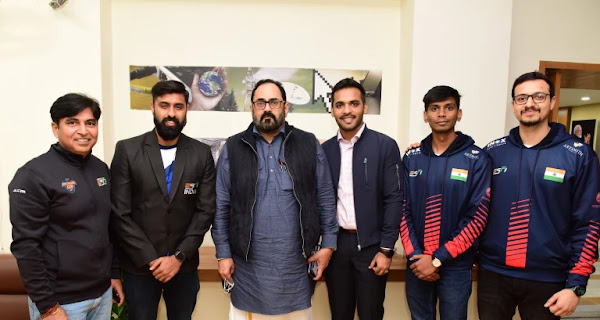Led by Rajeev Chandrasekhar, Minister of State for the Ministry of Electronics and Information Technology (MeitY), a meaningful and successful consultation on the proposed amendments to the IT Rules 2021 in relation to online gaming was held on Wednesday 11th January at Electronics Niketan, MeitY office in New Delhi. The consultation was attended by various stakeholders including children, parents, teachers, esports athletes, gamers, and safety and trust organizations.
Distinguished esports athletes such as Tirth Mehta (Asian Games’18 Bronze Medalist), Karman Singh Tikka (Team India – Esports, Asian Games’22), Dhruv Salvadi, and Snehil Ahirwar were present at the discussion. They provided fundamental insights and suggestions on the matter. Lokesh Suji, Director of Esports Federation of India and Board Member & VP, Asian Esports Federation, was also present at the meeting. Shri Priyank Kanoongo, Chairperson of the National Commission for Protection of Child Rights, also attended the meeting.
Professor (Dr.) Tejpavan Gandhok, Vice Dean – JGBS, Associate Director Centre for Sports Law & Governance, Jindal Global University, highlighted the need for differentiating between different segments of online games, such as real money, casual, esports, and learning games. He also emphasized the need for best practice safeguards to be adopted by the proposed guidelines and tailored for these 4 distinct segments.
According to MeitY’s Information Technology (IT) Rules, 2021, in relation to online gaming, “online game” means a game that is offered on the Internet and is accessible by a user through a computer resource if he makes a deposit with the expectation of earning winnings. This definition was queried by Dhruv Salvadi, an avid gamer who recently graduated from Manipal Institute of Technology, who pointed out that multiple esports tournaments organized at college or ground level at times require a registration fee in order for the athletes and teams to compete in it, whereupon the winners are presented with prizes which may be in cash and/or kind. He suggested that this rule may create confusion among the public regarding such esports tournaments/championships and highlighted the need for clarity in the definition of ‘online gaming’. He was also of the same opinion that instead of ‘online gaming’ it should be ‘igaming’ so as to establish a clear difference between Esports (which is a sport played electronically) and igaming.
This enlightening meeting will play a crucial role in the proposed amendments for the IT Rules related to igaming and propel the industry to remarkable heights. The discussion was productive and provided a platform for all stakeholders to express their views, concerns, and suggestions on the matter. It will be important for the government to consider these perspectives as they work to develop regulations that protect all stakeholders, including children, and promote growth and innovation in the industry.


